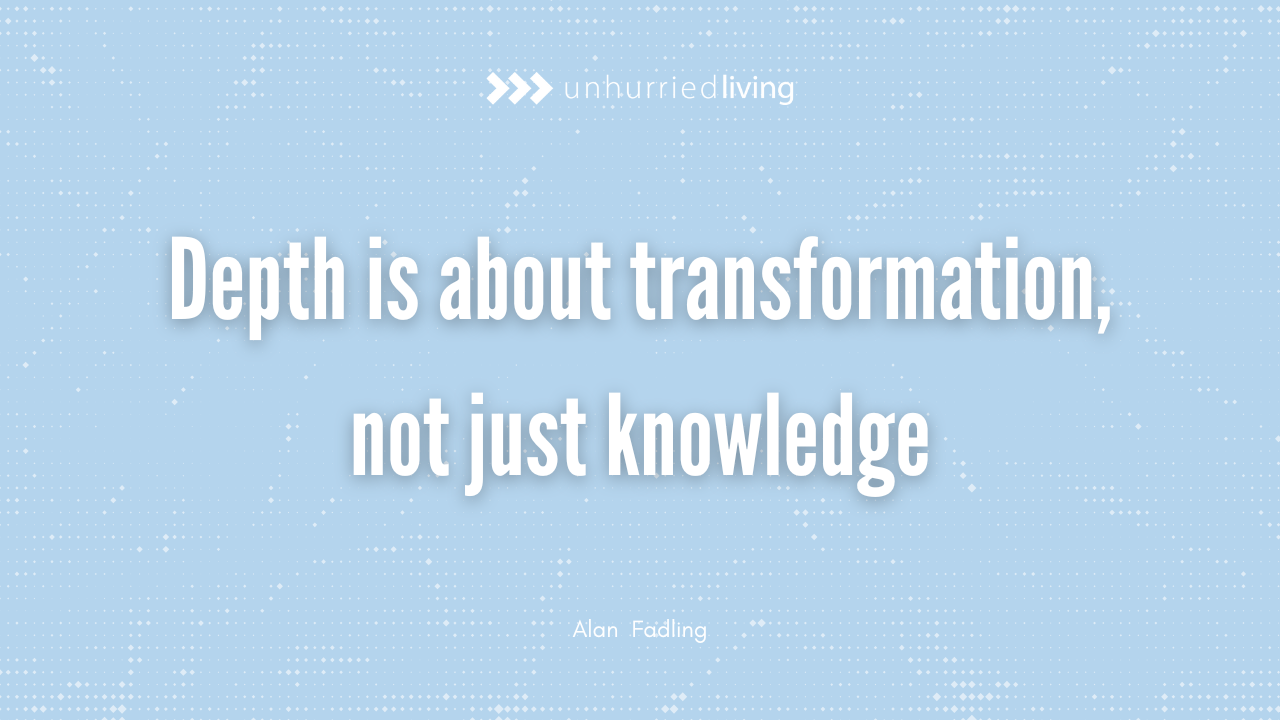From Shallow to Deep: What It Really Means to Grow in Christ
Sep 03, 2025
Blog by Alan Fadling
I love being near the ocean. I love standing on its shoreline and feeling how vast, how deep, how unfathomable it is. There’s something about depth that calls to us. The Psalms speak of the depth of God calling out to our own depths (Psalm 42:7). We don’t just feel longing for knowledge about God. We yearn for something richer, something truer, something that transforms us.
But many of us have felt the ache of a shallow faith, where we know a lot about God but don’t always feel deeply rooted in God. What does it really mean to go deeper? And how do we cultivate a faith that is more than just wide?
There is a great hunger for a deeper experience of God among those I train and coach. It is accompanied by a great dissatisfaction with what many have experienced in their communities of faith. I’m not trying to blame churches or pastors. I am a pastor and have been for over forty years. I believe God is working among us to lead us into a life of deeper rootedness in him.
Decades ago, J. I. Packer, a respected theologian, author, and pastor, quotes a native American Christian leader in his book A Quest for Godliness who observed “North American Protestantism…to be 3,000 miles wide and half an inch deep.”*
That’s a painful assessment, isn’t it? I’m confident that no one reading these words dreams of living their life half an inch deep. Who wants that? But it’s so easy in our hurry to find ourselves skimming the surface of our life and work with God.
Maybe you’ve said or heard someone else say something like this: “I want to go deeper in my walk with God.” It’s a good sentiment. It’s a beautiful intention. It resonates with my own desires. But what do we mean when we say this? What do we think it will look like to “go deeper”?
I wrote about this in An Unhurried Life and was reminded of it when I had the opportunity at the beginning of this year to narrate the revised audiobook. (It released in March and is now available anywhere you prefer to purchase audiobooks. I hope you’ll get yourself a copy. I’d love to be a voice of encouragement in that way.)
In narrating chapter 9, titled “Maturity,” the following passage I had written came alive for me in a fresh way:
I hear a lot of talk about “deep” when it comes to growing in Christ. My sense of what the average evangelical Christian means by deep is theologically, biblically, doctrinally rich and profound, and this is probably measured mostly in terms of cognitive content. But there are other ways to measure depth. There is soul depth, referring to the dynamics in my life with God and with other people. There is spiritual depth, meaning the level of my personal receptivity to and engagement with God in the moment-to-moment living of life. There is heart depth: I am more emotionally responsive to God and others as well as more willing to show my love for God by obeying him. Are we open to God’s bringing such depth to every facet of our lives? Will we enter into deep soul work, deep interaction with God, deep sharing of our lives together and deep engagement with the non-followers in our lives? Will we seek life deep and not settle for just intellect deep?†
I wonder how that passage strikes you? How have you heard the issue of “depth” described by the voices of influence in your own experience?
When we equate spiritual maturity with breadth of knowledge, we confuse being informed with being transformed. I’ve heard people say something like this about a particular Christian leader: “He’s not really very loving or kind, but he sure does know the Bible.” Such comments suggest that biblical knowledge is more important than love. But is it really? Is that the way of Jesus? Wasn’t that an essential element of the conflict Jesus had with some of the Jewish leaders of his day?
As we reflect on the call to go deep in our relationship with God, it’s important to remember that the richness of spiritual life is not measured by how much we know but by how much we are transformed—by how much we love. Depth is not a matter of mere theological knowledge. It’s about the posture of our hearts, the openness of our souls, and the responsiveness of our lives to God’s presence with us. It’s an invitation to move beyond surface-level engagement, to cultivate a life with God that is wide and deep, where knowledge leads to transformation and where every facet of our being is touched by his love.
For Reflection:
- How have you experienced a hunger for deeper connection with God, and in what ways have you noticed it influencing your life?
- In what areas of your life are you tempted to prioritize knowledge over transformation? How might you invite God to deepen your soul, spirit, and heart in those areas?
* J. I. Packer. The Quest for Godliness: The Puritan Vision of the Christian Life. Wheaton, IL: Crossway Books, 1990, p. 22.
† Alan Fadling. An Unhurried Life, rev. ed. Downers Grove, IL: InterVarsity Press, p. 160.


